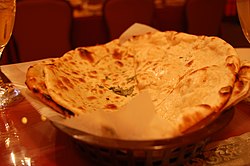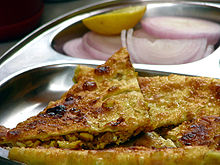Paratha: Difference between revisions
Undid revision 342590825 by 74.102.10.233 (talk) Tag: Non-autoconfirmed user rapidly reverting edits |
|||
| Line 23: | Line 23: | ||
==History and popularity== |
==History and popularity== |
||
The paratha was first conceived in the ancient [[Punjab region]], but soon became popular all over [[India]] (and even current Pakistan), including [[southern India]]. The southern Indian states have their own versions of the ubiquitous paratha, the most popular being the [[Kerala porotta]]. |
|||
jazz likes prantas / butter chicken/san francisco/ paneer |
|||
[[Indian diaspora|Indian immigrants]] took this dish to [[Malaysia]], [[Mauritius]] (where it is known as ''farata'') and [[Singapore]], resulting in variations such as [[roti canai]] and [[roti prata]]. In [[Myanmar]] (Burma), where it is known as ''palata'', it is eaten with curries or cooked with either egg or mutton, or as a dessert with [[white sugar]]. ''Htat ta ya'', literally 'a hundred layers', is a fried flaky multilayered paratha with either sugar or boiled peas (''pè byouk''). Paratha in [[Trinidad and Tobago]] differs from the South Asian paratha in that it is generally thinner and larger. In Trinidad and Tobago it is commonly called "buss up shot", referring to the method of making it - generally this involved the finished hot roti being struck to break it up into smaller pieces. It is not called "burst-up shirt", this is a misnomer usually used by non-[[Trinidadians]] or [[fresh-water Yankees]]. |
|||
==Types== |
==Types== |
||
Revision as of 00:08, 8 February 2010
 Mint Paratha from Punjab, India | |
| Place of origin | India |
|---|---|
| Region or state | India and other parts of southern Asia |
| Main ingredients | Atta, Maida |
A paratha (also spelled as parantha) (Hindi: पराँठा, Urdu: پراٹھا )is an Indian flat-bread that originated in the Indian subcontinent. Paratha is an amalgamation of the words parat (Hindi: परत, Bengali: পরত, Urdu:پرت ) and atta (Hindi: आटा, Bengali: আটা) which literally means layers of cooked flour.[1]
It is one of the most popular unleavened flat-breads in Indian cuisine and is made by pan frying whole-wheat flour on a tava.[2] The paratha dough usually contains ghee or cooking oil which is also layered on the freshly prepared paratha.[3] Parathas are usually stuffed with vegetables, such as boiled potatoes, radishes or cauliflower and/or paneer (South Asian cheese). A paratha (especially a stuffed one) can be eaten simply with a blob of butter spread on top or chutney,a spicy sauce made from yogurt and fresh herbs,but it is best served with pickles and yogurt, or thick spicy curries of meat and vegetables. Some people prefer to roll up the paratha into a tube and eat it with tea, often dipping the paratha into the tea.
The paratha can be round, square or triangular. In the former, the stuffing is mixed with the kneaded flour and the paratha is prepared as roti is, but in the latter two, the peda (ball of kneaded flour) is flattened into a circle, the stuffing is kept in the middle and the flatbread is closed around the stuffing like an envelope. The latter two also vary from the first in that, while the former is like a thick (in terms of width) version of the roti with filling inside, the latter two have discernible soft layers if one "opens" the crispier shell layers.
History and popularity
The paratha was first conceived in the ancient Punjab region, but soon became popular all over India (and even current Pakistan), including southern India. The southern Indian states have their own versions of the ubiquitous paratha, the most popular being the Kerala porotta.
Indian immigrants took this dish to Malaysia, Mauritius (where it is known as farata) and Singapore, resulting in variations such as roti canai and roti prata. In Myanmar (Burma), where it is known as palata, it is eaten with curries or cooked with either egg or mutton, or as a dessert with white sugar. Htat ta ya, literally 'a hundred layers', is a fried flaky multilayered paratha with either sugar or boiled peas (pè byouk). Paratha in Trinidad and Tobago differs from the South Asian paratha in that it is generally thinner and larger. In Trinidad and Tobago it is commonly called "buss up shot", referring to the method of making it - generally this involved the finished hot roti being struck to break it up into smaller pieces. It is not called "burst-up shirt", this is a misnomer usually used by non-Trinidadians or fresh-water Yankees.
Types





- Plain paratha (layerd roti without any stuffing except ghee & baked with ghee)
- Boondi Paratha (stuffed with salty boondi & baked with ghee)
- Gobhi paratha (stuffed with flavored cauliflower)
- Aloo (pronounced Aalu) paratha (stuffed with spicy boiled potato and onions mix)
- Tomato paratha (stuffed with tomatoes)
- Channa Dal paratha (stuffed with channa dal)
- Paneer paratha (stuffed with cottage cheese)
- Dal paratha (stuffed with boiled and mashed dal)
- Sattu paratha (stuffed with spiced sattu - roasted gram flour popular in Bihar)
- Kerala paratha (popular version pronounced "porotta")
- Roti paratha (Singapore & Malaysia - highly variable)
- Sugar paratha (layered with caramelized sugar, usually after a meal or as dessert)
- Lachha paratha - Tandoori (Punjabi in origin. Round in shape with multiple layers traditionally prepared in a tandoor.)
- Lachha paratha - Tawa wali (Popular in eastern India. Triangular in shape with multiple layers interspaced with ghee])
- Keema paratha - (also called Kheema paratha) (stuffed with flavored minced meat. Popular in Punjab)
- Anda paratha (stuffed with egg)
- Podeena paratha (laced with dry mint)
- Ceylon paratha (from Sri Lanka)
- Ajwain paratha (layered paratha laced with ajwain)
- Mooli paratha (stuffed with daikon radish)
- Pyaz ka paratha (stuffed with onion)
- Mughlai paratha (a deep fried stuffed paratha filled with egg and minced meat)
- Mattar paratha (stuffed with boiled, mashed and flavoured green peas)
- Jaipuri paratha
- Chili paratha/Mirchi Paratha (small, spicy shredded pieces)
- Methi wala paratha (stuffed with fenugreek leaves)
- Band gobi wala paratha/Patta gobhi paratha (stuffed with cabbage)
- Meetha Paratha (Stuffed with sugar)
- Palak Paratha
- Tandoori Paratha
- Putthay taway ka Paratha
- Bal wala Paratha
- Parton wala Paratha
- Chicken Paratha
- Pork Paratha
- Mutton Paratha
- Shrimp (large) Paratha
- Shrimp (small) Paratha
- Paratha Pizza Pops (Invented in Cleveland, Paratha stuffed with pizza sauce, cheese and toppings)
- Loki Paratha
- Batuha Paratha
- Gajar Paratha
- Dhaniya Paratha
- Chena Paratha
Miscellanea
The original variety of parathas is served within Punjab, however there are many varieties of South Indian 'Porotta'. They are covered in homemade butter and eaten by dipping pieces of the paratha in homemade yogurt. Parathas go best with lassi, a buttermilk drink also originating in Punjab.
Paratha (with yoghurt or pickles) is staple breakfast for a large number people in India.
Parathas are commonly eaten with yoghurt or with vegetables. They are often consumed with meat dishes, especially chicken, but don't combine well with high oil content foods such as curries.
Ready-made varieties
The process of layering the "skins" of dough in paratha can make preparation a difficult process. This, mixed with the popularity of this flatbread has opened the market to several ranges of frozen paratha — especially in Western markets where consumers seek the authenticity, but lack the time required to make a paratha from scratch.[citation needed]
See also
- Kerala porotta
- Chili parotha
- Roti prata, the Singaporean variant.
- Roti canai, the Indian Malaysian and Sumatranese variant.
- Bhatura
- Green onion pancake (Chinese variant)
- Gali Paranthe Wali



